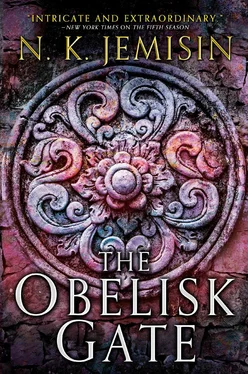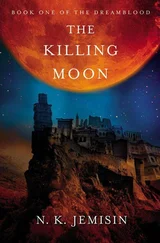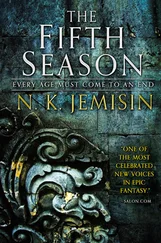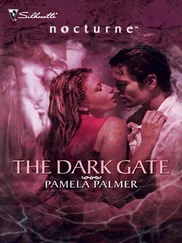And that is why, now, you walk through a Castrima-over that has been turned into a camp by the soldiers of Rennanis, and you are actually afraid. It’s always harder to fight for other people than for the self.
The ash has been falling steadily for a year now, and the comm is knee-deep in the stuff. There’s been at least one rain to tamp it down recently, so you can sess a kind of damp-mud crust underneath the powdery layer on top, but even that’s substantial. Enemy soldiers crowd the porches and doorways of the once-empty houses, watching you, and the untamped ash under the eaves is halfway up most of the houses’ walls. They’ve had to dig out the windows. The soldiers look like… just people, because they don’t wear uniforms, but there is a uniformity to them nevertheless: They are all fully Sanzed or very Sanzed-looking. Where you can see color in their ash-faded travel clothing, you spot that telltale scrap of prettier, more delicate cloth tied around their upper arms or wrists or foreheads. No longer displaced Equatorials, then; they’ve found a comm. Something older and more primal than a comm: They are a tribe . And now they’re here to take what’s yours.
But beyond that they are just people. Many are your age or older. You guess that a lot of them are surplus Strongbacks or commless trying to prove their usefulness. There are slightly more men than women, but that follows, too, since most comms are quicker to kick out those who can’t produce babies than those who can—but the number of women here means that Rennanis isn’t hurting for healthy repopulators. A strong comm.
Their eyes follow you as you walk down Castrima-over’s main street. You stand out, you know, with your ashless skin and clean hair and your clothes bright with color. Just brown leather pants and unbleached white in your shirt, but these are colors that have become rare in this world of gray streets and gray dead trees and a gray, heavily clouded sky. You’re the only Midlatter that you see, too, and you’re small compared to most of them.
Doesn’t matter. Behind you floats the spinel, remaining precisely one foot behind the back of your head and turning slowly. You aren’t making it do that. You don’t know why it’s doing that, really. Unless you hold it in your hand, that’s what the thing does: You tried to set it down, but it floated back up and moved behind you like this. Should’ve asked Alabaster how to make it behave before you killed him, oh well. Now it’s flickering a little, real to translucent to real again, and you can hear—not sess, hear —the faint hum of its energies as it turns. You see people’s faces twitch as they notice. They might not know what it is, but they know a bad thing when they hear it.
At the center of Castrima-over is a domed, open pavilion that Ykka tells you was once the comm’s gathering center, used for wedding dances and parties and the occasional comm-wide meeting. It’s been turned into some sort of operations center, you see as you walk toward it: A gaggle of men and women stand, squat, or sit around within it, but one knot of them stands around a freshly made table. When you get close enough, you see that they’ve got a crudely made diagram of Castrima and map of the local area side by side, which they’re discussing. To your dismay, you can see that they’ve marked at least one of the ventilation ducts—the one that’s behind a small waterfall at the nearby river. They probably lost a scout or two finding it: The river’s banks are by now infested with boilbug mounds. Doesn’t matter; they found it, and that’s bad.
Three of the people talking over the maps look up as you approach. One of them elbows another, who turns and shakes awake someone else as you walk into the pavilion and stop a few feet from the table. The woman who gets up, rubbing her face blearily as she comes to join the others, does not look particularly impressive. She’s cut her hair on the sides to just above her ears—a painfully blunt chop that looks to have been done with a knife. It makes her look small, even though she’s not particularly: Her torso is a smooth barrel, brief breasts blending into a belly that’s probably carried at least one child, and legs like basalt pillars. She’s not wearing anything more than the others; her sash of tribe membership is just a fading yellow silk kerchief hanging loosely around her neck. But there’s a gravity in her gaze, even half-asleep, that makes you focus on her.
“Castrima?” she asks you, by way of greeting. It’s all that really matters about who you are, anyway.
You nod. “I speak for them.”
She rests her hands on the table, nodding. “Our message got delivered, then.” Her gaze flicks to the spinel hovering behind you, and something adjusts in her expression. It’s not hate that you’re seeing. Hate requires emotion. What this woman has simply done is realize you are a rogga, and decide that you aren’t a person, just like that. Indifference is worse than hate.
Well. You can’t muster indifference in response; you can’t help but see her as human. Have to make do with hate, then. And what’s more interesting is that she somehow knows what the spinel is, and what it means. Very interesting.
“We’re not joining you,” you say. “You want to fight over that, so be it.”
She tilts her head to one side. One of her lieutenants chuckles into their hand, but is swiftly glared silent by another. You like the silencing. It’s respectful—of your abilities if not of you per se, and of Castrima even if they don’t think you have a chance. Even if you actually, probably, don’t have a chance.
“We don’t even have to attack, you realize,” the woman says. “We can just sit up here, kill anybody who comes up to hunt or trade. Starve you out.”
You manage not to react. “We have a little meat. It’ll take awhile—months at least—for the vitamin deficiencies to set in. Our stores are pretty solid otherwise.” You force a shrug. “And other communities have gotten around meat shortages easily enough.”
She grins. Her teeth aren’t sharpened, but you think momentarily that her canines are longer than they strictly need to be. It’s probably projection. “True, if that’s your taste. Which is why we’re also working on finding your vents.” She taps the map. “Close them up and suffocate you till you’re weak, then break down those barriers you’ve put across the tunnels and dance right in. Stupid to live underground; once someone knows you’re there, you’re actually an easier target, not a harder one.”
This is true, but you shake your head. “We can be hard enough, if you push us. But Castrima isn’t rich, and our storecaches aren’t any better than those of another comm that’s not full of roggas.” You pause for effect. The woman doesn’t flinch, but there’s a shuffle among the other people in the pavilion as they realize. Good. That means they’re thinking. “So many easier nuts to crack out there. Why are you bothering with us?”
You know why they’re really doing this, because Gray Man’s after orogenes who can open the Obelisk Gate, but that can’t be what he’s told them. What could induce a strong, stable Equatorial comm to turn conqueror? Wait, no; it can’t be stable. Rennanis is relatively close to the Rift. Even with living node maintainers, life in such a comm would be hard. Daily blow-throughs of noxious gas. Ashfall much worse than here, requiring people to wear masks at all times. Earth help them if it rains; it could be pure acid, and that’s if rain is even possible with the Rift cranking out heat and ash nearby. Doubtful they have any livestock… so maybe they’re facing a meat shortage, too.
“Because this is what it will take to survive,” the woman says, to your surprise. She straightens and folds her arms. “Rennanis has too many people for our stores. All the survivors of every other Equatorial city have come to camp on our doorstep. We would’ve had to do this anyway, or have problems with too large of a commless population in the area. Might as well weaponize them into feeding themselves, and bringing what’s left back home to the comm. You know this Season isn’t going to end.”
Читать дальше












